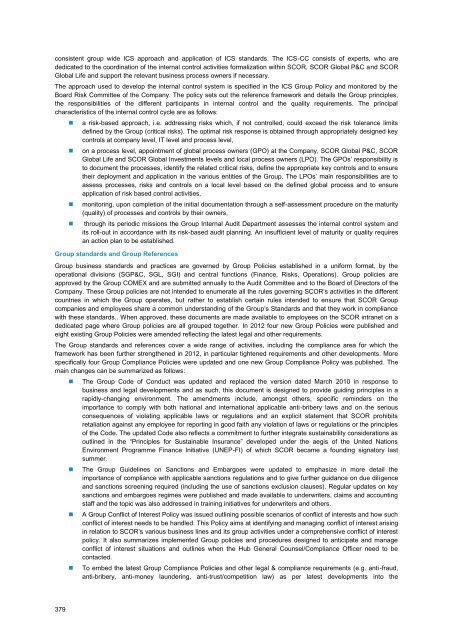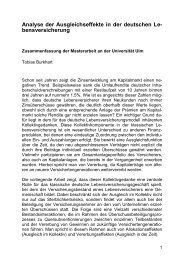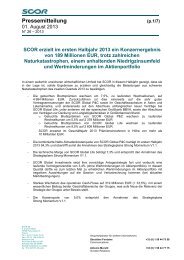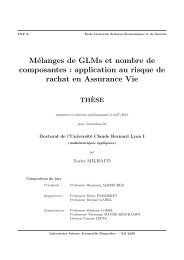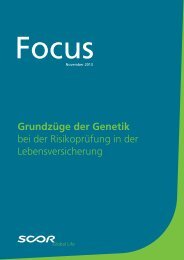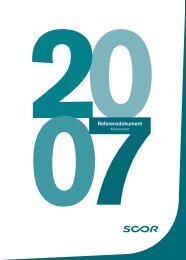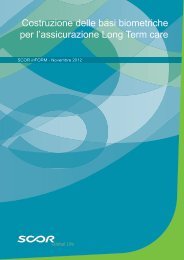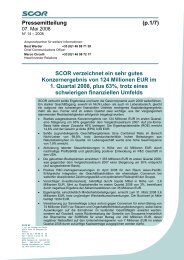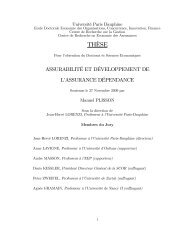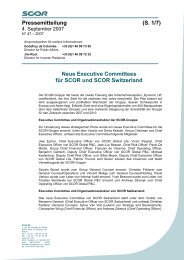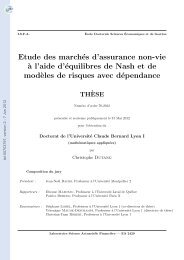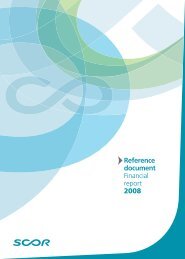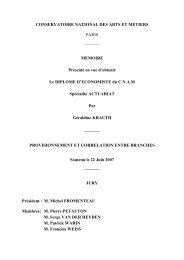4.4 Legal risk - Scor
4.4 Legal risk - Scor
4.4 Legal risk - Scor
Create successful ePaper yourself
Turn your PDF publications into a flip-book with our unique Google optimized e-Paper software.
consistent group wide ICS approach and application of ICS standards. The ICS-CC consists of experts, who are<br />
dedicated to the coordination of the internal control activities formalization within SCOR, SCOR Global P&C and SCOR<br />
Global Life and support the relevant business process owners if necessary.<br />
The approach used to develop the internal control system is specified in the ICS Group Policy and monitored by the<br />
Board Risk Committee of the Company. The policy sets out the reference framework and details the Group principles,<br />
the responsibilities of the different participants in internal control and the quality requirements. The principal<br />
characteristics of the internal control cycle are as follows:<br />
• a <strong>risk</strong>-based approach, i.e. addressing <strong>risk</strong>s which, if not controlled, could exceed the <strong>risk</strong> tolerance limits<br />
defined by the Group (critical <strong>risk</strong>s). The optimal <strong>risk</strong> response is obtained through appropriately designed key<br />
controls at company level, IT level and process level,<br />
• on a process level, appointment of global process owners (GPO) at the Company, SCOR Global P&C, SCOR<br />
Global Life and SCOR Global Investments levels and local process owners (LPO). The GPOs’ responsibility is<br />
to document the processes, identify the related critical <strong>risk</strong>s, define the appropriate key controls and to ensure<br />
their deployment and application in the various entities of the Group. The LPOs’ main responsibilities are to<br />
assess processes, <strong>risk</strong>s and controls on a local level based on the defined global process and to ensure<br />
application of <strong>risk</strong> based control activities,<br />
• monitoring, upon completion of the initial documentation through a self-assessment procedure on the maturity<br />
(quality) of processes and controls by their owners,<br />
• through its periodic missions the Group Internal Audit Department assesses the internal control system and<br />
its roll-out in accordance with its <strong>risk</strong>-based audit planning. An insufficient level of maturity or quality requires<br />
an action plan to be established.<br />
Group standards and Group References<br />
Group business standards and practices are governed by Group Policies established in a uniform format, by the<br />
operational divisions (SGP&C, SGL, SGI) and central functions (Finance, Risks, Operations). Group policies are<br />
approved by the Group COMEX and are submitted annually to the Audit Committee and to the Board of Directors of the<br />
Company. These Group policies are not intended to enumerate all the rules governing SCOR’s activities in the different<br />
countries in which the Group operates, but rather to establish certain rules intended to ensure that SCOR Group<br />
companies and employees share a common understanding of the Group’s Standards and that they work in compliance<br />
with these standards.. When approved, these documents are made available to employees on the SCOR intranet on a<br />
dedicated page where Group policies are all grouped together. In 2012 four new Group Policies were published and<br />
eight existing Group Policies were amended reflecting the latest legal and other requirements.<br />
The Group standards and references cover a wide range of activities, including the compliance area for which the<br />
framework has been further strengthened in 2012, in particular tightened requirements and other developments. More<br />
specifically four Group Compliance Policies were updated and one new Group Compliance Policy was published. The<br />
main changes can be summarized as follows:<br />
• The Group Code of Conduct was updated and replaced the version dated March 2010 in response to<br />
business and legal developments and as such, this document is designed to provide guiding principles in a<br />
rapidly-changing environment. The amendments include, amongst others, specific reminders on the<br />
importance to comply with both national and international applicable anti‐bribery laws and on the serious<br />
consequences of violating applicable laws or regulations and an explicit statement that SCOR prohibits<br />
retaliation against any employee for reporting in good faith any violation of laws or regulations or the principles<br />
of the Code. The updated Code also reflects a commitment to further integrate sustainability considerations as<br />
outlined in the “Principles for Sustainable Insurance” developed under the aegis of the United Nations<br />
Environment Programme Finance Initiative (UNEP-FI) of which SCOR became a founding signatory last<br />
summer.<br />
• The Group Guidelines on Sanctions and Embargoes were updated to emphasize in more detail the<br />
importance of compliance with applicable sanctions regulations and to give further guidance on due diligence<br />
and sanctions screening required (including the use of sanctions exclusion clauses). Regular updates on key<br />
sanctions and embargoes regimes were published and made available to underwriters, claims and accounting<br />
staff and the topic was also addressed in training initiatives for underwriters and others.<br />
• A Group Conflict of Interest Policy was issued outlining possible scenarios of conflict of interests and how such<br />
conflict of interest needs to be handled. This Policy aims at identifying and managing conflict of interest arising<br />
in relation to SCOR’s various business lines and its group activities under a comprehensive conflict of interest<br />
policy. It also summarizes implemented Group policies and procedures designed to anticipate and manage<br />
conflict of interest situations and outlines when the Hub General Counsel/Compliance Officer need to be<br />
contacted.<br />
• To embed the latest Group Compliance Policies and other legal & compliance requirements (e.g. anti-fraud,<br />
anti-bribery, anti-money laundering, anti-trust/competition law) as per latest developments into the<br />
379


